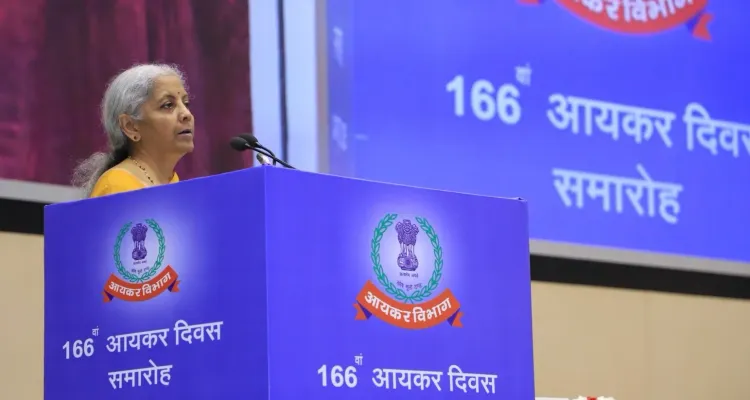Is the New Income Tax Bill's Simplified Language a Game Changer?

Synopsis
Key Takeaways
- Simplified language enhances understanding of tax provisions.
- Focus on taxpayer-centricity and compliance.
- Expedited resolution of tax disputes is prioritized.
- Regional performance reviews to streamline operations.
- Support for staff is essential for better service delivery.
New Delhi, July 25 (NationPress) The implementation of simplified language in the newly introduced Income Tax Bill, 2025 signifies a major transformation aimed at making its provisions more accessible and comprehensible, thereby minimizing the chances of misinterpretation and improving taxpayer-centricity and compliance, as stated by Finance Minister Nirmala Sitharaman.
She urged the Income Tax Department to expedite the resolution of disputed tax demands pending before faceless appellate authorities and to ensure a timely clearing of the litigation backlog. Moreover, she emphasized the need for the Department to identify and withdraw departmental appeals that fall below the revised monetary thresholds announced in the Union Budget 2024-25 within a three-month timeframe.
“It is crucial to ensure prompt processing of tax refunds and to proactively resolve taxpayer grievances in a timely manner. A thorough analysis of these grievances should be conducted to develop strategies aimed at not just addressing current issues but also tackling the root causes of these grievances,” she remarked at an event celebrating the 166th Income Tax Day.
Additionally, she requested the Department to conduct regional performance reviews to pinpoint factors that may be inhibiting performance and to streamline operations using indicators such as grievance disposal, Orders Giving Effect (OGE) issuance, rectification completion, and the processing of condonation cases under Section 119.
The Finance Minister also took a moment to commend the Department for its impressive efforts in efficiently drafting the New Income Tax Bill, 2025 within the designated timeframe. She expressed appreciation for the Department's active engagement with the recommendations provided by the Select Committee.
Looking into the future, the Finance Minister highlighted the necessity of maintaining this positive momentum, reaffirming the potential for further technological advancements to bolster consistent and efficient service delivery.
She encouraged the Department to commit to serving taxpayers with fairness, empathy, and professionalism, thereby building public trust not just through policy but through their overall conduct.
“The CBDT must ensure that we provide adequate support to our staff and officers in terms of better workspaces and residential accommodations, so they do not face difficult commuting situations. I stress that the CBDT and the Department of Revenue prioritize the rapid development of family accommodations and improved workspaces,” she asserted.






